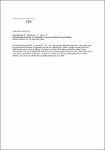Methodological quality of systematic reviews on influenza vaccination
Remschmidt, Cornelius
Wichmann, Ole
Harder, Thomas
Background: There is a growing body of evidence on the risks and benefits of influenza vaccination in various target groups. Systematic reviews are of particular importance for policy decisions. However, their methodological quality can vary considerably. Objectives: To investigate the methodological quality of systematic reviews on influenza vaccination (efficacy, effectiveness, safety) and to identify influencing factors. Methods: A systematic literature search on systematic reviews on influenza vaccination was performed, using MEDLINE, EMBASE and three additional databases (1990–2013). Review characteristics were extracted and the methodological quality of the reviews was evaluated using the assessment of multiple systematic reviews (AMSTAR) tool. U-test, Kruskal–Wallis test, chi-square test, and multivariable linear regression analysis were used to assess the influence of review characteristics on AMSTAR-score. Results: Fourty-six systematic reviews fulfilled the inclusion criteria. Average methodological quality was high (median AMSTAR-score: 8), but variability was large (AMSTAR range: 0–11). Quality did not differ significantly according to vaccination target group. Cochrane reviews had higher methodological quality than non-Cochrane reviews (p = 0.001). Detailed analysis showed that this was due to better study selection and data extraction, inclusion of unpublished studies, and better reporting of study characteristics (all p < 0.05). In the adjusted analysis, no other factor, including industry sponsorship or journal impact factor had an influence on AMSTAR score. Conclusions: Systematic reviews on influenza vaccination showed large differences regarding their methodological quality. Reviews conducted by the Cochrane collaboration were of higher quality than others. When using systematic reviews to guide the development of vaccination recommendations, the methodological quality of a review in addition to its content should be considered.
No license information

